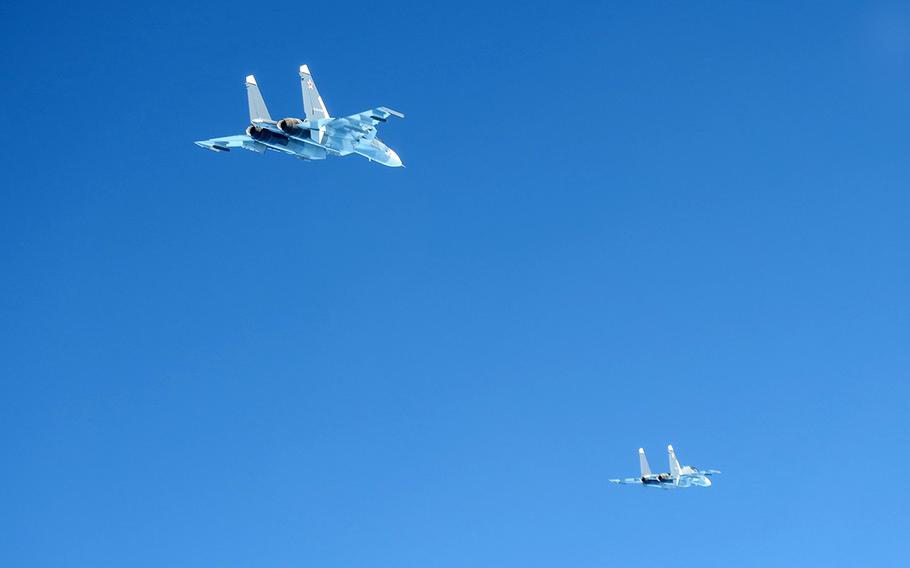
NATO jets intercepted two Russian fighter jets July 15, 2024, which an alliance statement said were flying with no transponder and no coordination with civilian air traffic control over international waters close to NATO territory. (Facebook/NATO Allied Air Command/Swedish air force)
STUTTGART, Germany — Two fighter planes flying from Russia’s military hub in Kaliningrad were intercepted over the Baltic Sea this week by allied quick reaction aircraft, according to NATO.
Pilots from NATO’s two newest members, Finland and Sweden, scrambled Monday when air operations centers tracked the Russian planes, NATO said Tuesday.
Both NATO’s Combined Air Operations Center in Germany and similar centers in Sweden and Finland were monitoring the flight path of the Russian fighters.
“These (airplanes) were not on a flight plan, not in radio contact with civilian air traffic control and did not use a transponder signal as customary under international aviation rules,” NATO’s air command said in a statement.
NATO did not specify the models of the Russian aircraft.
The operation highlights how Finland and Sweden have integrated into NATO’s military operations, and the alliance’s missile defense plans and air policing strategy.
The Nordic allies also have forged closer ties with the United States, with both countries now part of the U.S. National Guard’s State Partnership Program, which assigns countries to various American states to foster military cooperation.
For NATO, enhancements to the readiness of its air defenses have been a priority over the past year.
At the alliance’s summit last week in Washington, members agreed on a new rotational model. It provides additional forces that can be transferred around alliance territory on short notice to safeguard airspace.
“In the short term, NATO will rotate modern air defense systems across the eastern flank to strengthen its deterrence posture, while over the medium term, it will improve surveillance, interceptors and command and control systems,” Maj. Gen. Matt Van Wagenen, deputy chief of staff for operations at NATO’s military headquarters, said in a separate Monday statement.
The U.S. is planning over the next two years to deploy to Germany long-range artillery units, Tomahawks and other hypersonic weapon systems under development.
The moves, announced during the NATO summit, involve episodic deployments that will eventually lead to the basing of such forces in Europe, the White House said.
Moscow has lashed out in response to the decision.
“Europe is a target for our missiles, our country is a target for U.S. missiles in Europe,” Kremlin spokesman Dmitry Peskov said Saturday. “We have enough capacity to contain these missiles, but the potential victims are the capitals of these countries.”
On Russian state television, other politicians and talking heads made similar threats, singling out U.S. bases in Europe as potential targets for missiles launched from Kaliningrad, a military exclave situated between Poland and Lithuania.
Since Moscow’s 2022 invasion of Ukraine, military saber rattling directed at NATO has become commonplace from a Kremlin furious over the alliance’s backing of Ukraine.